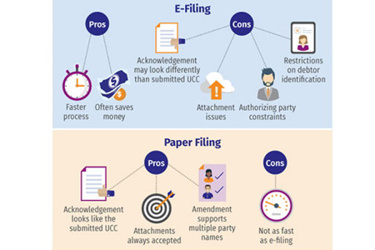UCC E-Filing Vs. Paper Filing: Considerations For UCC Documents

Beverly Odom, Transactional Business Consultant for Wolters Kluwer CT Corporation
Electronic filing of UCCs has increased at a steady pace over the past few years. In fact, some states have already adopted the policy of accepting UCC filings submitted electronically as their only option. While there are many benefits to the electronic filing process there are also some differences that someone new to the option might not realize. Many of these differences are small but could possibly cause a secured party to default to utilizing the paper filing option.
Attachments variations
Attachments to the face page of the UCC are often utilized by the secured party to outline the collateral which is being pledged. Be mindful that there are some states that do not electronically accept a UCC filing if it includes an attachment. In those states, the UCC with its attachment would need to be manually filed.
Acknowledgment page - differences
Due to the importance of a UCC filing, there are often many people who review the document prior to the filing being submitted. The expectation is the acknowledgment will be returned reflecting exactly what was submitted by the secured party. One of the most often mentioned concerns about electronic filing is that the acknowledgment page received from the state will sometimes contain minor changes from the document that was prepared and submitted. These changes will not alter the effectiveness of the UCC, none the less, some creditors are not comfortable with the variations. A few of the notable minor changes may be seen in the font size, font type or capitalization changes.
E-filing – limits on authorizing party names on UCC3s
The electronic filing systems in many jurisdictions allow for the entry of only a single authorizing party name for UCC3 amendments. This can cause an issue for UCC3s that contain multiple secure parties, especially terminations. In instances such as these, a paper document would need to be submitted.
Debtor type restrictions
Be aware that in some jurisdictions there is not an option when you electronically file to identify a specific type of debtor such as a transmitting utility or manufactured home. In these states, a paper filing would need to be submitted if the debtor type needs to be acknowledged.
Conclusion
In summary, e-filing will often save the filer money and time but may not work for every situation. This article is not intended to present one option as better than the other, but simply to alert a new adopter of electronic filings of some variations.
Source: Wolters Kluwer CT Corporation
